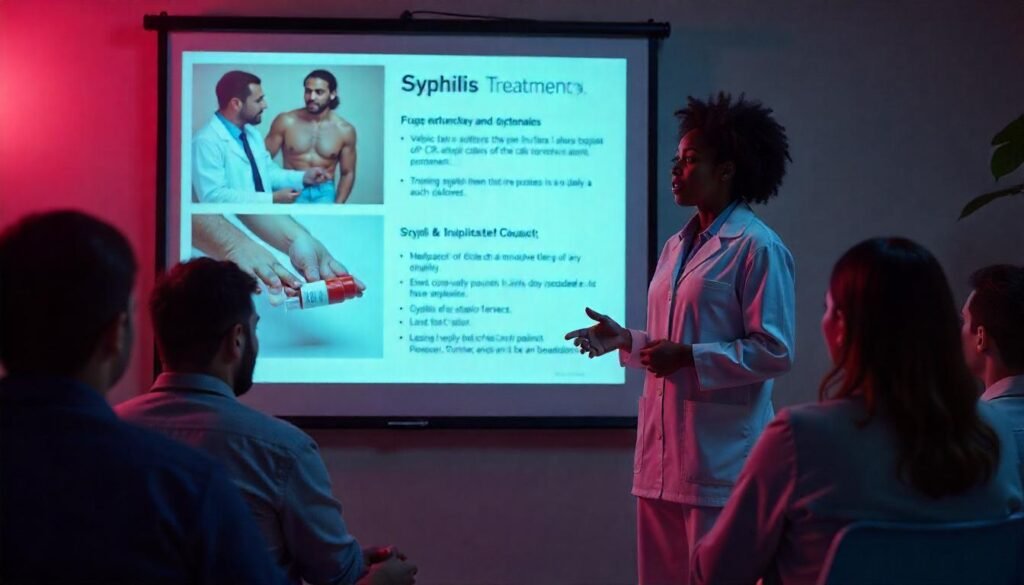Introduction
This article discusses syphilis treatment. Syphilis, a sexually transmitted infection (STI) caused by the bacterium Treponema pallidum, has been a public health concern for centuries. Despite its historical significance, many individuals remain unaware of its symptoms, transmission methods, and, most importantly, treatment options. This guide aims to provide an in-depth understanding of syphilis treatment, ensuring that readers are well-informed and equipped to seek appropriate medical care. By the end of this article, you will not only grasp the essentials of syphilis treatment but also understand its importance in maintaining sexual health.

Table of Contents
What is Syphilis?
Syphilis is a bacterial infection that progresses through distinct stages: primary, secondary, latent, and tertiary. Each stage presents unique symptoms, and if left untreated, syphilis can lead to severe health complications, including damage to organs such as the heart, liver, and brain. Understanding these stages is crucial in recognizing the importance of timely syphilis treatment.
Primary Stage
The initial stage of the infection is marked by the emergence of a sore that is typically painless, referred to as a chancre. This particular sore usually manifests within a time frame of about three weeks following exposure to the infectious agent. Due to its lack of pain, many individuals may fail to notice the presence of this sore, which can lead to delays in seeking medical attention. Consequently, the chancre might go unobserved, allowing the infection to progress without being detected. It is important to be aware of this symptom, as its discreet nature can hinder early diagnosis and syphilis treatment.
Secondary Stage
If left untreated, syphilis can advance to the secondary stage of the infection. This particular stage is characterized by a variety of symptoms that may include rashes on different parts of the body, fever, swollen lymph nodes, and a general feeling of fatigue or malaise. It is important to note that these symptoms can often be easily mistaken for those of other illnesses or infections, which can complicate diagnosis and syphilis treatment. As a result, remaining aware of the potential signs and symptoms of syphilis is crucial for early detection and timely medical intervention.
Latent Stage
The latent stage is a phase that occurs when the visible symptoms associated with an infection have subsided and are no longer present, yet the bacteria themselves continue to reside within the body. This particular stage can persist for an extended period, often lasting for many years without any noticeable signs of illness. It is important to note that without appropriate medical treatment during this time, individuals may find themselves at risk of eventually progressing to the more severe tertiary stage of the disease, where complications may arise.
Tertiary Stage
The tertiary stage of the disease may manifest many years after the person has first been infected, often leading to a range of severe health complications that can have serious implications for the individual’s overall well-being. These complications can include, but are not limited to, significant cardiovascular issues that can affect heart function and circulation, various neurological problems that may impair cognitive and motor functions, and in some tragic cases, may even lead to death if not properly managed and treated.
How is Syphilis Transmitted?
Syphilis is primarily transmitted through sexual contact, including vaginal, anal, and oral sex. The bacteria can enter the body through mucous membranes or breaks in the skin. It is essential to note that syphilis can be transmitted even when an infected person does not exhibit symptoms.
Key Transmission Facts
- Direct Physical Contact: Syphilis sores, which can manifest on various parts of the body, are known to be extremely infectious. Participating in sexual activities with someone who has been diagnosed with syphilis significantly heightens the risk of the infection being transmitted from one person to another. It is crucial to understand that these sores can easily spread the bacteria, making safe practices essential in preventing outbreaks.
- Impact on Pregnancy: For pregnant women who are infected with syphilis, there is a serious risk of passing the infection along to their developing baby. This transmission can occur during pregnancy and may result in congenital syphilis, a condition that can lead to severe and sometimes life-threatening health complications in newborns. Therefore, expectant mothers need to be aware of their health status and seek medical care to protect both themselves and their children from this dangerous infection.
Syphilis Treatment Options
The positive aspect of syphilis is that it is a condition that can be effectively treated, particularly when it is detected and addressed in its early stages. Timely intervention significantly increases the likelihood of a successful recovery. The main method of syphilis treatment involves the use of antibiotics, which are essential for combating the infection. Among the various antibiotics available, penicillin is the one most frequently prescribed by healthcare professionals due to its proven efficacy in treating this sexually transmitted infection.

Antibiotic Syphilis Treatment
- Penicillin: This medication is considered the first-line syphilis treatment option for individuals diagnosed with all stages of syphilis, a sexually transmitted infection. For those in the early stages of syphilis, a single intramuscular injection of benzathine penicillin G is generally all that is necessary to effectively treat the infection. However, for patients who are in the late stages of the disease, it may be required to administer additional doses of benzathine penicillin G to ensure complete elimination of the bacteria responsible for the infection. It is important for patients to follow up with their healthcare provider to confirm that treatment has been successful.
- Alternatives for Allergic Patients: In cases where individuals have a documented allergy to penicillin, alternative antibiotic options can be considered as replacements for penicillin. Medications such as doxycycline or tetracycline may be prescribed as a suitable alternative for those who cannot tolerate penicillin. Nevertheless, it is essential for patients suffering from penicillin allergies to consult a qualified healthcare professional before beginning any treatment regimen. This ensures that the healthcare provider can accurately assess the individual’s specific medical history and determine the most appropriate and effective syphilis treatment option for their condition.
Follow-Up Care for Syphilis Treatment
Once syphilis treatment has been completed, it is critically important to schedule follow-up appointments to confirm that the infection has been completely cleared from the system. These follow-up visits play a vital role in assessing the patient’s health status and ensuring that the treatment was effective. To accomplish this, blood tests are routinely performed at intervals of 6 months and again at 12 months after the treatment has concluded. These tests help in monitoring the long-term effectiveness of the therapy and provide valuable insights into the patient’s recovery progress. It is, therefore, essential not to overlook these appointments as they are key to ensuring ongoing health and well-being.
Preventing Syphilis: Best Practices
While syphilis treatment is effective, prevention remains the best strategy against syphilis and other STIs. Here are several key practices to consider:
- Using Condoms: The consistent and correct use of condoms is one of the most effective methods available to significantly reduce the risk of transmitting syphilis as well as other sexually transmitted infections (STIs). It is important to ensure that condoms are used properly every time during sexual activity, as this greatly enhances their effectiveness in providing protection against these infections.
- Regular Testing: Engaging in regular STI screenings is absolutely crucial for maintaining sexual health, particularly for individuals who are sexually active and have multiple partners. These screenings allow for the early detection of infections, which is vital as it leads to timely syphilis treatment. Early intervention not only helps in managing the infection but also significantly reduces the risk of complications that can arise from untreated STIs.
- Limit Sexual Partners: One effective strategy to lower the risk of exposure to syphilis and other STIs is to consciously reduce the number of sexual partners. By limiting sexual encounters, individuals can minimize their chances of coming into contact with infections, thereby promoting better overall sexual health.
- Open Communication: Engaging in open and honest discussions about sexual health with partners can create a safer and more supportive sexual environment. It is beneficial to encourage partners to get tested regularly, as this practice fosters mutual trust and responsibility regarding sexual health. By prioritizing communication, individuals can work together to ensure that both partners are informed and proactive about their health, ultimately leading to safer sexual experiences.
Conclusion
Understanding syphilis treatment is vital for maintaining sexual health and preventing the spread of this infection. With effective antibiotic treatment available, timely intervention can lead to complete recovery and a return to good health. By following preventive measures and engaging in open discussions about sexual health, individuals can protect themselves and their partners from syphilis and other STIs.
If you suspect you may have syphilis or have been exposed to someone with the infection, it is crucial to seek medical attention promptly. Remember, knowledge is power, and being informed is the first step towards a healthier future.
Frequently Asked Questions (FAQs)
1. Can syphilis be cured?
Indeed, syphilis is a curable infection when treated with the right antibiotics. The most effective treatment for this condition is primarily penicillin, which has been widely recognized for its efficacy in eliminating the bacteria responsible for syphilis.
2. How long does syphilis treatment take?
In many cases, a single injection of penicillin is often enough to effectively treat early-stage syphilis. This antibiotic works well to eliminate the infection at this stage. However, it is important to emphasize that follow-up tests are necessary after the syphilis treatment has been administered. These follow-up tests are essential to confirm that the infection has been successfully cleared from the body, ensuring that no lingering traces remain.
3. Can I get syphilis again after treatment?
Indeed, it is entirely possible for an individual to contract syphilis once more if they are exposed to someone who is infected, even after having undergone syphilis treatment for the disease. This highlights the importance of taking preventive measures to reduce the risk of re-infection. Being proactive in protecting oneself from exposure is essential in maintaining sexual health and preventing the spread of this infection.
4. What are the long-term effects of untreated syphilis?
If syphilis is left untreated, it can result in a range of serious health complications that may significantly impact various aspects of a person’s well-being. These complications can include, but are not limited to, substantial damage to vital organs such as the heart and brain, as well as other important bodily systems that are crucial for maintaining overall health and functionality.
5. Is it safe to have sex after treatment?
It is highly recommended that you take the necessary time to wait patiently until your healthcare provider has definitively confirmed that the infection has been completely cleared from your system. Only after receiving this confirmation should you consider resuming any kind of sexual activity. This precaution is essential in order to effectively prevent any potential transmission of the infection to others, ensuring everyone’s health and safety in the process.
By understanding syphilis, its treatment, and prevention strategies, individuals can take proactive steps towards maintaining their sexual health and well-being.



Hi my family member! I wish to say that this article is amazing, nice written and come with approximately all important infos. I抎 like to look extra posts like this .